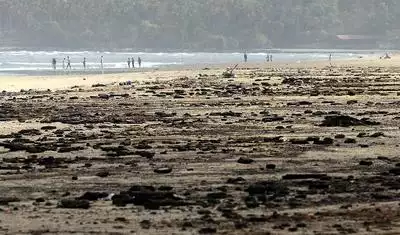In a first, debris washing up on Goa’s shores to be studied

Panaji: When the waves lap the shore along Goa’s 100+ km-long coastline, with the seafoam comes debris of different kinds. As the waters withdraw, the shore is left with not just tide lines but debris lines, with plastics and other waste.
Now, in a unique effort, the Goa State Biodiversity Board (GSBB) will begin a study of this debris line and of the nature of wastes thrown up by the sea. It has engaged the assistance of all 44 coastal village biodiversity management committees (BMC).
The debris lines will be examined and the waste will be collected for processing accordingly. Any seaweeds found washed up along the shore will be collected and sent for preservation and for further studies.
“As the waves recede, a debris line is created along the coast. But so far, no study on this debris line has been carried out. This debris line is indicative of the disposal patterns. At times, seaweeds, dead animals, jellyfish and starfish are washed ashore. While some of the debris is residual plastic, others are valuable, like seaweed,” said GSBB chairperson Pradip Sarmokadam.
The effort will help in collecting, preserving, and studying the economic potential of seaweed, he said.
“Seaweed has tremendous economic potential which needs to be studied,” he said. “On the other hand, we need to collect and give residual waste for responsible disposal. We are tying up with the Goa Waste Management Corporation to dispose of such waste collected. Residual plastic is one of the most difficult to dispose of for panchayats, as they are plastics with food tied inside and cannot be recycled.”
He said the idea is to get such residual plastic waste out of the beach ecosystem.
“Beaches are among the most vulnerable ecosystems,” he said. “And such waste can affect various ecosystems on a beach, like the sand dune vegetation. We have already started conducting rigorous meetings with the 44 coastal village biodiversity committee members to explain the project and its importance. Our environment minister Nilesh Cabral has also approved the programme.”
He said the study of the debris line and processing of the debris washed up on the shore is also a part of the strategy to build climate resilience.
“As a part of building climate resilience, we also need to be more watchful of the beach ecosystem,” he said.





